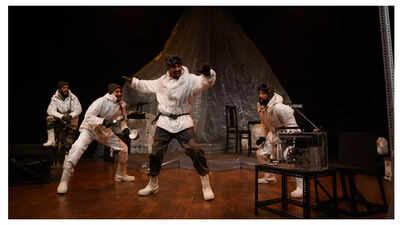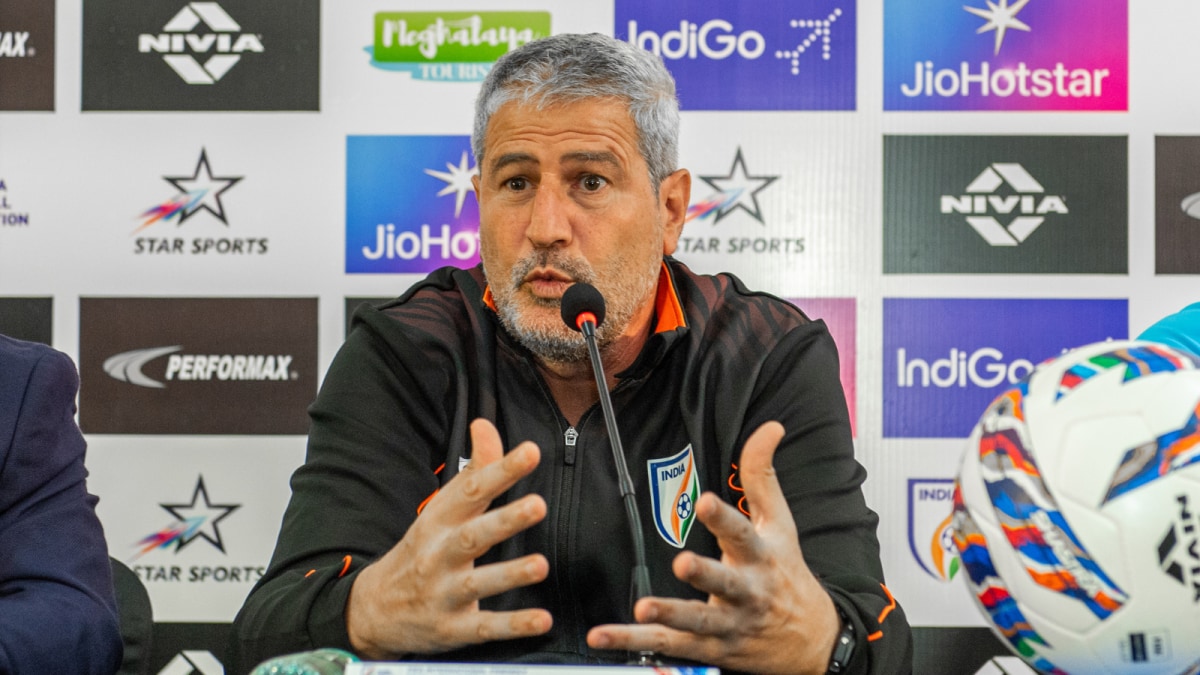ARTICLE AD BOX

Aditya Rawal and Zahan Kapoor revisit 'Siachen,' a play exploring the emotional and creative depths of soldiers on the icy frontlines. Guided by Makarand Deshpande, they've refined the production based on audience feedback and personal artistic growth over two years. The play delves into themes of war, inner conflict, nationalism, duty, and identity, aiming for a sharper, more layered experience.
As Siachen returns to stage this week, writer-actor Aditya Rawal and lead performer Zahan Kapoor, reflect on the emotional and creative journey behind the play that explores the icy frontlines of war and inner conflicts of soldiers. With new edits and deeper insights gained over two years of performances, the duo, guided by director Makarand Deshpande, promise a sharper and more layered experience, shaped as much by the audience reactions as by their own artistic evolution in the last two years.Excerpts from the conversation…Siachen is being staged again. What does it mean to both of you to return to this play now, and what can audiences expect this time around?Aditya Rawal: The play has been running for two years now, so every time we get together it feels like a homecoming, especially at Prithvi Theatre. This time around, we have made some new additions and edits, so the audience can expect a sharper, more engaging experience.
Also, when it comes to theatre, actors and the technicians keep discovering things in a play - so they keep getting better. For example, when Al Pacino played Richard III, it was only after about 80 performances that he figured out how to utter one of the character's most famous lines, "A horse! A horse! My kingdom for a horse!”.Zahan Kapoor: It’s always a pleasure to return to the rehearsal room and even more so when we are prepping for shows at Prithvi.
With each successive run, the learning has been incredible and a true testimony to how endless the process of discovery can be.I’d hope audiences are as intrigued as we are into the story, the characters and the presentation we have put together.Aditya, what was the initial spark behind writing Siachen? Did any particular incident, news story, or personal reflection set this story in motion?Aditya Rawal: As a keen student of military history, I was always fascinated by the Siachen Glacier, the coldest, highest battlefield on earth, where there has been a ceasefire since 2003.
And yet, the best soldiers of India and Pakistan are deployed there to face the greatest enemy of all, mother nature. The sole deterrent to vacating our respective positions is the fear that the other will occupy it immediately after, thereby gaining the strategic high ground.
To me, this conflict is emblematic of war, in general, and of all human conflict that stems from distrust. It is an absurd and tragic conflict, but the play asks: Is it also necessary?Zahan, how did you first come on board for Siachen? What about the script or character immediately spoke to you?Zahan Kapoor: Aditya and I were trying to make the most of our time during the second lockdown of the pandemic where we would read and discuss plays.
Aditya mentioned that he had developed this story while he was in drama school and we decided to have a read. One thing lead to another, but it seemed like the perfect fit. A homegrown story, set against a unique backdrop and intimate so we could attempt to make it into something real.Working with Makarand Deshpande, what was special?Aditya Rawal: Makarand Deshpande is the director and guiding light of our play. The joy, freedom and lack of fear with which he approaches the creative process really stood out for me.
Our cast and crew are all in their 20's or early 30's yet he always felt like the youngest person in the room. Working with him has shaped not only the play, but also all of us as artists.Zahan Kapoor: Mak sir is an incredible source of inspiration. I admire his sense of playfulness most of all, and then it’s his sense of discipline and dedication. He has decades of experience and understands so many aspects of the theatre, it’s truly amazing.
Having him guide us as we searched for meaning and impact has been a pleasure and a privilege.Aditya, how did you strike a balance between the play’s physical setting—the cold, isolating glacier—and the internal worlds of the characters?Aditya Rawal: The ideal is to be both immersive and engaging. You want the audience to believe in the world you create and be fully involved in it while telling them a story that is emotionally moving.
The research I had done allowed me to feel secure in my knowledge of the world so I could focus completely on the characters and their journeys. If you understand both facets well enough, then the world invariably affects the characters and you're able to figure out how they would react in the given situation too.
That said, you can never really know a world or people to the fullest - and our play reflects that sense of surrender as well.Zahan, coming from a rich legacy of theatre and film, what excites you about working in a contemporary original play like Siachen? Do you approach it differently than your other roles?Zahan Kapoor: I honestly try to approach all roles in a similar way. I’m very proud that we have presented an original story, and along side a very interesting cast and crew. It’s our first step into building our own repertoire.Theatre is live, raw, and unpredictable. Were there any performances or rehearsals that stood out—either because they were challenging or unexpectedly moving?Aditya Rawal: The early rehearsals were challenging because we were trying to figure out the shape of the play.
Then, with two weeks to go the actor in one of the lead parts had to drop out. Niketan Sharma stepped in and, guided by Makarand Sir, breathed life into the character superbly despite the shortage of time. So, basically the entire rehearsal process was memorable to me! As for shows, the two we performed in front of a packed audience at the Kamani Auditorium in Delhi; first at the biggest theatre festival in the world, NSD's Bharat Rang Mahotsav, and the month after at the Mahindra Excellence in Theatre Awards.Zahan Kapoor: Oh there’s been so many, it’s hard to choose! It’s a wonderful feeling to make breakthroughs in rehearsal and equally, it’s crushing yet deeply essential, to hit blocks and feel stuck too. Theatre really keeps your ego in check, it’ll you get too carried away with “getting it right” you’ll quickly find yourself in a fix. It compels you to let go of expectations and discover afresh every time.Has the audience response from the earlier shows influenced the way you're approaching this restaging? Have any reactions stayed with you?Aditya Rawal: Absolutely.
A play is an ever shifting, ever changing thing. Everything, even the actor's mood on the day, influences the nature of a performance.The reactions that are most dear to us are of the members of the armed forces that have come to watch our play, especially the ones that have served on the glacier and other high-altitude regions. When they say that the play reflects the experiences they had whilst serving - it makes everything we do feel worth it.Zahan Kapoor: Yes I think there have been many things we have learned from audience reactions, maybe some edits, maybe some clarifications; all in all, this is part of the beauty of theatre, its dynamic and fluctuating. We needn’t try to fix it too much.Siachen touches on ideas of nationalism, duty, and identity. In today’s climate, do you feel these themes are being received differently or more urgently?Aditya Rawal: Certainly.
Because these themes are talked about more often and in greater depth, people have begun to appreciate the nuances of every difficult situation; the fact that nothing is truly black and white. Of course, there has been a regrettable swing the other way too, and telling stories like Siachen is our way to reveal aspects of humanity that are often ignored in conflict situations.Zahan Kapoor: It may seem so, there’s definitely a sense of immediacy to some of the ideas, especially considering our recent conflict. Beyond simple arguments though, is always a deeply felt experience of loss, triumph, meaning and purpose. It all comes down to the clash of ideas and human emotions, that part is probably eternal.



.png)
.png)
.png)
















 5 hours ago
5
5 hours ago
5









 English (US) ·
English (US) ·